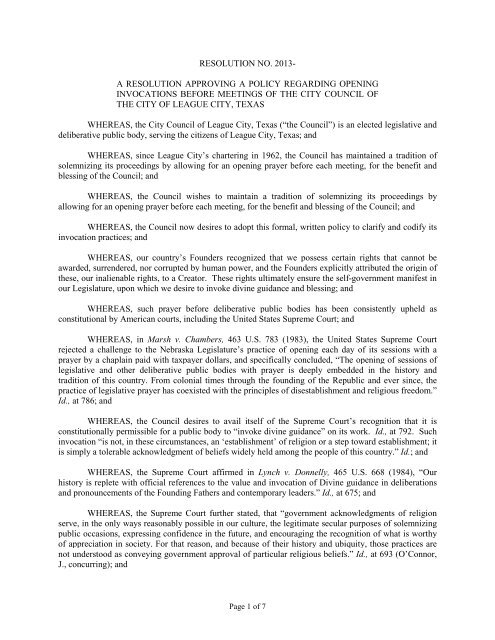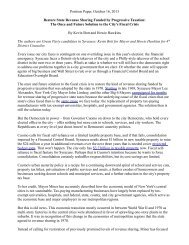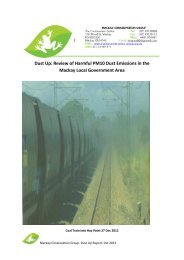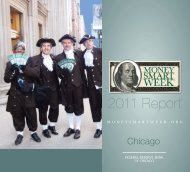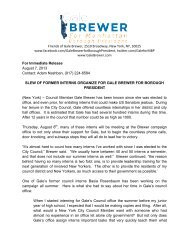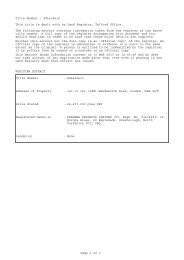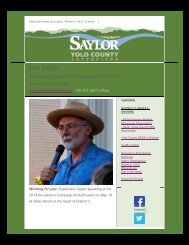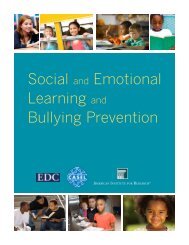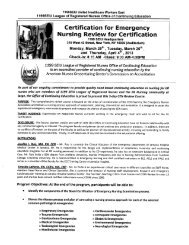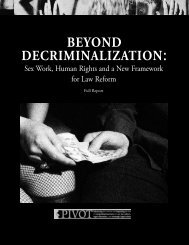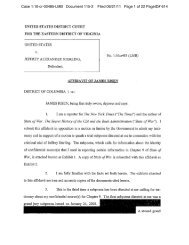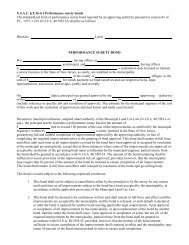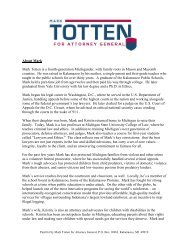13-1230 - Proposed Resolution
13-1230 - Proposed Resolution
13-1230 - Proposed Resolution
You also want an ePaper? Increase the reach of your titles
YUMPU automatically turns print PDFs into web optimized ePapers that Google loves.
RESOLUTION NO. 20<strong>13</strong>-A RESOLUTION APPROVING A POLICY REGARDING OPENINGINVOCATIONS BEFORE MEETINGS OF THE CITY COUNCIL OFTHE CITY OF LEAGUE CITY, TEXASWHEREAS, the City Council of League City, Texas (“the Council”) is an elected legislative anddeliberative public body, serving the citizens of League City, Texas; andWHEREAS, since League City’s chartering in 1962, the Council has maintained a tradition ofsolemnizing its proceedings by allowing for an opening prayer before each meeting, for the benefit andblessing of the Council; andWHEREAS, the Council wishes to maintain a tradition of solemnizing its proceedings byallowing for an opening prayer before each meeting, for the benefit and blessing of the Council; andWHEREAS, the Council now desires to adopt this formal, written policy to clarify and codify itsinvocation practices; andWHEREAS, our country’s Founders recognized that we possess certain rights that cannot beawarded, surrendered, nor corrupted by human power, and the Founders explicitly attributed the origin ofthese, our inalienable rights, to a Creator. These rights ultimately ensure the self-government manifest inour Legislature, upon which we desire to invoke divine guidance and blessing; andWHEREAS, such prayer before deliberative public bodies has been consistently upheld asconstitutional by American courts, including the United States Supreme Court; andWHEREAS, in Marsh v. Chambers, 463 U.S. 783 (1983), the United States Supreme Courtrejected a challenge to the Nebraska Legislature’s practice of opening each day of its sessions with aprayer by a chaplain paid with taxpayer dollars, and specifically concluded, “The opening of sessions oflegislative and other deliberative public bodies with prayer is deeply embedded in the history andtradition of this country. From colonial times through the founding of the Republic and ever since, thepractice of legislative prayer has coexisted with the principles of disestablishment and religious freedom.”Id., at 786; andWHEREAS, the Council desires to avail itself of the Supreme Court’s recognition that it isconstitutionally permissible for a public body to “invoke divine guidance” on its work. Id., at 792. Suchinvocation “is not, in these circumstances, an ‘establishment’ of religion or a step toward establishment; itis simply a tolerable acknowledgment of beliefs widely held among the people of this country.” Id.; andWHEREAS, the Supreme Court affirmed in Lynch v. Donnelly, 465 U.S. 668 (1984), “Ourhistory is replete with official references to the value and invocation of Divine guidance in deliberationsand pronouncements of the Founding Fathers and contemporary leaders.” Id., at 675; andWHEREAS, the Supreme Court further stated, that “government acknowledgments of religionserve, in the only ways reasonably possible in our culture, the legitimate secular purposes of solemnizingpublic occasions, expressing confidence in the future, and encouraging the recognition of what is worthyof appreciation in society. For that reason, and because of their history and ubiquity, those practices arenot understood as conveying government approval of particular religious beliefs.” Id., at 693 (O’Connor,J., concurring); andPage 1 of 7
WHEREAS, the Supreme Court famously observed in Zorach v. Clauson, 343 U.S. 306, (1952),“We are a religious people whose institutions presuppose a Supreme Being.” Id., at 3<strong>13</strong>-14; andWHEREAS, the Supreme Court acknowledged in Holy Trinity Church v. United States, 143 U.S.457 (1892), that the American people have long followed a “custom of opening sessions of alldeliberative bodies and most conventions with prayer...,” Id., at 471; andWHEREAS, the Supreme Court has determined, “The content of [such] prayer is not of concernto judges where . . . there is no indication that the prayer opportunity has been exploited to proselytize oradvance any one, or to disparage any other, faith or belief.” Marsh, 463 U.S. at 794-795; andWHEREAS, the Supreme Court also proclaimed that it should not be the job of the courts ordeliberative public bodies “to embark on a sensitive evaluation or to parse the content of a particularprayer” offered before a deliberative public body. Id.; andWHEREAS, the Supreme Court has counseled against the efforts of government officials toaffirmatively screen, censor, prescribe and/or proscribe the specific content of public prayers offered byprivate speakers, as such government efforts would violate the First Amendment rights of those speakers.See, e.g., Lee v. Weisman, 505 U.S. 577, 588-589 (1992); andWHEREAS, in Simpson v. Chesterfield County Bd. of Supervisors, 404 F.3d 276 (4 th Cir. 2004),cert. denied, the United States Court of Appeals for the Fourth Circuit reviewed and specifically approvedas constitutional the prayer policy of a county board, and made a number of key findings about saidpolicy; andWHEREAS, the Council is not bound by decisions of the Fourth Circuit, but herebyacknowledges the general guidance provided by the most important of that court’s findings in Simpson,including the facts that the policy there:A. Allowed for invocations for the benefit of the legislative body itself “rather than for theindividual leading the invocation or for those who might also be present,” Id., at 284; andB. Established a practice of compiling a list of local monotheistic congregations, “withaddresses taken primarily from the phone book,” whereto the county clerk would send aninvitation each December addressed to the “religious leader” of each congregation, Id., at279; andC. Required the county clerk to schedule respondents to the invitation “to give theinvocation on a first-come, first-serve basis,” Id.; andD. Thus, "made plain that [the county board] was not affiliated with any one specific faithby opening its doors to a wide pool of clergy." Id., at 286; andWHEREAS, the Fourth Circuit showed little concern that the prayers before board meetings inSimpson were “traditionally made to a divinity that is consistent with the Judeo-Christian tradition,” Id.,at 280, because Marsh also considered, and found constitutionally acceptable, the fact that the prayers inquestion fit broadly within ‘the Judeo-Christian tradition.’” Id., at 283 (quoting Marsh, 463 U.S. at 793);andPage 2 of 7
WHEREAS, in Rubin v. City of Lancaster, 710 F.3d 1087 (9th Cir. Cal. 20<strong>13</strong>), the United StatesCourt of Appeals for the Ninth Circuit reviewed and specifically approved as constitutional a citycouncil’s prayer policy, and made a number of key findings about said policy; andWHEREAS, the Council is not bound by decisions of the Ninth Circuit, but hereby acknowledgesthe general guidance provided by the most important of that court’s findings in Rubin, including the factsthat the policy there:A. The City of Lancaster took every feasible precaution, short of requiring volunteer prayergiversto refrain altogether from referencing sectarian figures, to ensure neutrality, Id., at1097; andB. No person attending a city council meeting was required to participate in any prayer, Id.,at 1097; andC. No volunteer prayer-giver was paid to pray, Id.; andD. The council never inquired into or reviewed the content of any prayer to be offered, Id.;andE. The council never attempted to influence the determination of which volunteer prayergiverwas selected to pray, Id., at 1098; andF. The City of Lancaster designed its policy to adhere to Marsh’s strictures and askedvolunteer prayer-givers to do the same, Id.; andWHEREAS, the Ninth Circuit focused its inquiry on the policy’s neutrality and the principle ofprivate choice, not on the number of volunteers from a particular sect, Id., at 1100; andWHEREAS, the Ninth Circuit rejected a request that it order the City of Lancaster “to review as amatter of course the text of every proposed prayer, approving for delivery only those drafts rid of allreferences to saints, disciples, prophets, deities, and the like,” Rubin, 710 F.3d at 1100; andWHEREAS, the Ninth Circuit not only held that prayers “in the name of . . .” religious figures areconstitutionally permissible, but a policy prohibiting such prayers is wrought with “First Amendmentinfirmities,” Id., at 1100; andWHEREAS, on the same day the Ninth Circuit decided Rubin, the Eleventh Circuit decidedAtheists of Fla., Inc. v. City of Lakeland, 7<strong>13</strong> F.3d 577 (11th Cir. Fla. 20<strong>13</strong>), and reached the sameconclusion that the City of Lakeland’s policy permitting prayer before city commission legislativesessions was constitutionally permissible; andWHEREAS, in Pelphrey v. Cobb County, 547 F.3d 1263, 1278 (11 th Cir. 2008), the United StatesCourt of Appeals for the Eleventh Circuit followed the rationale and reasoning of Marsh and Simpson andupheld the constitutionality of a county commission’s invocation policy;WHEREAS, the Eleventh Circuit in Pelphrey specifically rejected the argument that theEstablishment Clause permits only nonsectarian prayers at legislative meetings, holding instead thatprayers are permitted as long as “there is no indication the that prayer opportunity has been exploited toproselytize or advance any one, or to disparage any other, faith or belief,” Id. at 1266;Page 3 of 7
WHEREAS, the Council intends to avoid all of the unique circumstances that rendered theunconstitutional practices at issue in Wynne v. Town of Great Falls, 376 F.3d 292 (4 th Cir. 2002), cert.denied, where a town Board “improperly ‘exploited’ a ‘prayer opportunity’ to ‘advance’ one religion overothers.” Id., at 298 (quoting Marsh, 463 U.S. at 794), including the facts that:A. The town council’s resolution declared its intent that “the Town's prayers are not just forthe Council members but for all of the Town's citizens,” and thus prayers were “directedat” the citizenry, Wynne, 376 F.3d at 301, n.7; andB. The town council “steadfastly refused” to invoke any “deity associated with any specificfaith other than Christianity,” Id., at 300, n.5; andC. The town council “advance[d] its own religious views in preference to all others,” Id., at302; andD. Town council members publicly chided and “ostracized” those who refused to participatein their prayers, Id., at 298; andWHEREAS, the Council intends, and has intended in past practice, to adopt a policy that does notproselytize or advance any faith, or show any purposeful preference of one religious view to the exclusionof others; andWHEREAS, the Council recognizes its constitutional duty to interpret, construe, and amend itspolicies and ordinances to comply with constitutional requirements as they are announced; andWHEREAS, the Council accepts as binding the applicability of general principles of law and allthe rights and obligations afforded under the United States and Texas Constitutions and statutes.NOW, THEREFORE, BE IT RESOLVED BY THE CITY COUNCIL OF LEAGUE CITY,TEXAS, as follows:Section 1. In order to solemnize proceedings of the City Council of League City, Texas, it isthe policy of the Council to allow for an invocation or prayer to be offered before its meetings forthe benefit of the Council.Section 2. The prayer shall not be listed or recognized as an agenda item for the meeting oras part of the public business.Section 3. No member or employee of the Council or any other person in attendance at themeeting shall be required to participate in any prayer that is offered.Section 4. The prayer shall be voluntarily delivered by an eligible member of the clergy inLeague City, Texas. To ensure that such person (the “invocation speaker”) is selected fromamong a wide pool of League City, Texas’ clergy, on a rotating basis, the invocation speakershall be selected according to the following procedure:A. The City Secretary shall compile and maintain a database (the “Congregations List”) ofthe religious congregations with an established presence in League City, Texas.B. All congregations with an established presence in League City, Texas are eligible toappear in the Congregations List, and any such congregation can confirm its inclusion byPage 4 of 7
specific written request to the Secretary. The Congregations List shall also include thename and contact information of any chaplain who may serve one or more of the firedepartments or law enforcement agencies of League City, Texas.C. The City Secretary may not inquire into the faith, denomination, or other religious beliefof a congregation before adding it to the Congregations List.D. The Congregations List shall be compiled by referencing the listing for “churches,”“congregations,” or other religious assemblies in the annual telephone directory (e.g.Yellow Page) published for League City, Texas, research from the internet andnewspaper, and consultation with local chambers of commerce.E. The Congregations List shall be updated, by reasonable efforts of the City Secretary, inNovember of each calendar year.F. Within thirty (30) days of the effective date of this policy, and on or about December 1 ofeach calendar year thereafter, the City Secretary shall mail an invitation addressed to the“religious leader” of each congregation listed on the Congregation List, as well as to theindividual chaplains on the Congregations List.G. The invitation shall be dated at the top of the page, signed by the City Secretary at thebottom of the page, and state:Dear League City Religious Leader,The City Council of League City, Texas makes it a policy to invitemembers of the clergy in League City to voluntarily offer a prayer beforethe beginning of its meetings, for the benefit and blessing of the Council.As the leader of one of the religious congregations with an establishedpresence in the local community, or in your capacity as a chaplain forone of the local fire departments or law enforcement agencies, you areeligible to offer this important service at an upcoming meeting of theCouncil.If you are willing to assist the Council in this regard, please send awritten reply at your earliest convenience to the Secretary to the Councilat the address included on this letterhead. Clergy are scheduled on afirst-come, first-served basis. The dates of the Council’s scheduledmeetings for the upcoming year are listed on the following, attachedpage. If you have a preference among the dates, please state that requestin your written reply.This opportunity is voluntary, and you are free to offer the invocationaccording to the dictates of your own conscience. However, please trynot to exceed no more than five (5) minutes for your presentation. Tomaintain a spirit of respect and ecumenism, the City Council requeststhat the prayer opportunity not be exploited as an effort to proselytize orconvert others, nor to disparage any faith or belief different than that ofthe invocation speaker.Page 5 of 7
On behalf of the City Council of League City, Texas, I thank you inadvance for considering this invitation.Sincerely,City SecretarySection 5. The volunteer prayer-giver shall deliver the prayer or invocation in his or hercapacity as a private citizen, and according to the dictates of his or her own conscience.Section 6. No guidelines or limitations shall be issued regarding an invocation’s content,except that the Council shall request by the language of this policy that no prayer shouldproselytize or advance any faith, or disparage the religious faith or non-religious views of other,or exceed five (5) minutes in length.Section 7. No volunteer prayer-giver shall receive supplemental compensation of any kindfor providing the prayer or invocation.Section 8. No volunteer prayer-giver shall be scheduled to offer a prayer at consecutivemeetings of the Council, or at more than six (6) Council meetings in any calendar year.Section 9. No member of the Council shall engage in any prior inquiry, review of, orinvolvement in, the content of any prayer to be offered by the scheduled volunteer prayer-giver.Section 10. To clarify the Council’s intentions, as stated herein above, the followingdisclaimer shall be included in at least ten (10) point font at the bottom of any printed agendapublished by City Council:“Any invocation that may be offered before the official start of the City Council meeting shall bethe voluntary offering of a private citizen, to and for the benefit of the Council. The views orbeliefs expressed by the invocation speaker have not been previously reviewed or approved by theCouncil and do not necessarily represent the religious beliefs or views of the Council in part oras a whole. No member of the community is required to attend or participate in the invocationand such decision will have no impact on their right to actively participate in the business of theCouncil.”Section 11. Shortly before the opening gavel that officially begins the meeting and theagenda/business of the public, the Chairperson of the Council shall introduce the invocationspeaker, and invite only those who wish to do so to stand for those observances of and for theCouncil.Section 12. This policy in not intended, and shall not be implemented or construed in anyway, to affiliate the Council with, nor express the Council’s preference for, any faith or religiousdenomination. Rather, this policy is intended to acknowledge and express the Council’s respectfor the diversity of religious denominations and faiths represented and practiced among thecitizens of League City, Texas.Section <strong>13</strong>. All resolutions and agreements in conflict herewith are hereby repealed to theextent of the conflict only.NOW, THEREFORE, BE IT FURTHER RESOLVED that this policy shall become effectiveimmediately upon adoption by the Council.Page 6 of 7
PASSED AND APPROVED at the regular meeting of the City Council of League City, Texas, on____________________, 20<strong>13</strong>.ATTEST:____________________________TIMOTHY PAULISSEN,Mayor_______________________________DIANA M. STAPP,City SecretaryPage 7 of 7


